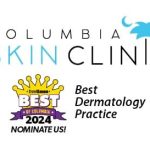With hundreds of sun protection brands on the market, choosing the best sunscreen for your skin type and sun exposure can be overwhelming. Columbia Skin Clinic has compiled and created this helpful information to help you protect your skin year-round.
Do we really need sunscreen?
According to the CDC, skin cancer is the most common form of cancer in the United States. Every year, 6.1 million adults are treated for skin cancer. One in five Americans will develop skin cancer in their lifetimes.
Ultraviolet rays from sun exposure cause skin cancer, one of the most preventable types of cancer. Broad-spectrum sunscreen contains compounds that absorb and reflect ultraviolet rays, making it a life-saving product.
Wearing a sunblock is important year-round, but as the weather warms, it is vital to use the best sunscreen for skin cancer prevention.
What is the best sunscreen?
Purchasing and applying sunscreen may seem straightforward. As long as you use the product like your dermatologist recommends, what could go wrong? A lot!
Not all sunscreens are created equal. The type of product you use and how you apply it makes a difference in its effectiveness. The most effective sunscreen offers broad-spectrum protection, an SPF of 50 and contains safe ingredients.
Sunscreen for the body and the face also differ. Facial sunblocks are made to prevent breakouts and acne. Body and aerosol products are not. Learn more HERE.
Columbia Skin Clinic dermatologists strongly recommend that you always read the label of any product before making a purchase. The label lists coverage, ingredients and how long the sunscreen will last, which are all important to know.
What you need to look for when buying sunscreen:
1. Select a product that offers “full-spectrum” or “broad-spectrum” protection. Broad-spectrum sunscreens ensure you have full protection from cancer-causing ultraviolet or UV rays. There are two separate types of UV rays: UVA and UVB. UVA rays cause skin damage below the surface of the skin and make the skin age faster. UVB rays cause sunburns and damage to the surface of the skin.
Most sunscreens in the U.S. do not protect against both UV rays, so looking for a full-spectrum or broad-spectrum product is important. According to the FDA, sunscreen can only be called “broad-spectrum” if it blocks both types of UV rays.
2. Choose a product with a sun protection factor (SPF) of 50. If you don’t use a high enough SPF, you may put your skin in danger. The higher the SPF, the higher the level of protection it provides. That noted, our dermatologists believe the healthiest sunscreen has a 50 SPF. This level absorbs or reflects 98% of the sun’s rays, while products above 50 SPF only provide about 1% more sun protection.
SPF only measures a sunscreen’s protection against UVB rays. It does not protect against UVA radiation.
3. Avoid products containing oxybenzone and retinyl palmitate. These ingredients can cause allergic reactions and increase the development of skin tumors.
Some chemicals in sunscreen also wreak havoc on the world’s coral reefs. Oxybenzone damages oceanic coral reefs by inhibiting their ability to reproduce and making them more susceptible to bleaching.
4. Select products with zinc oxide and titanium dioxide as their active ingredients. Always opt for more effective lotion-type products instead of spray-ons.
The dermatologists at Columbia Skin Clinic are serious about helping you find the best sunscreen. See their top-rated sunscreens HERE.
Are homemade and DIY sunscreens effective?
Many people today prefer natural alternatives for their personal care products, including sunscreen. If you look up “DIY sunscreen,” countless blog posts and recipes will pop up, along with many false claims.
Although homemade sunscreens are generally not harmful, their protection against the sun’s harmful rays is inadequate and ineffective. Many recipes simply blend essential oils without providing any true sun protection. Even if a DIY sunblock includes skin-protecting minerals, its actual SPF cannot be determined without lab testing.
While homemade or DIY sunscreens may have some appeal, protecting your skin is paramount. Chemical-based sunblocks consist of active ingredients that the FDA has approved. Using proven methods to prevent sun damage is important to prevent skin cancer.
What is a good natural sunscreen?
Mineral sunscreens are a natural, non-toxic alternative to chemical-based sunscreens. They offer protection against UVA and UVB rays. Although their sun protection ratings are lower than those of chemical-based sunscreens, mineral sunscreens can be used to prevent sunburns.
Another natural option is to select a product with zinc oxide. Zinc oxide works by reflecting the sun’s rays rather than absorbing and reflecting them, like chemical-based sunscreens. Clear zinc 50 is an inexpensive option for sun protection that can be found at many drug stores.
When should I use sunscreen and how often should I apply it?
Even after reading all the labels and choosing the right product, you may still not get all the necessary benefits to protect your skin if you do not apply it correctly.
1. Wear sunscreen every day. People should wear sunscreen every day, even in the winter. UVB rays decrease during the winter, but UVA rays can be problematic in any season. These rays can lead to premature skin aging and skin cancer. Using a broad-spectrum product every day will ensure your skin is protected.
2. Apply the product before you head outdoors. It takes a full 15 minutes for sunblock to be completely absorbed into your skin. This means you should apply it BEFORE going in the sun to be fully protected at all times.
3. Ensure you use enough sunscreen. Most people only use about 25% to 50% of the recommended amount, which is insufficient to protect their skin completely. Adults should use one ounce of sunscreen, enough to fill a shot glass, to adequately cover their entire bodies.
4. Reapply every two hours or less. A higher SPF does not mean your sunscreen will last longer. Columbia Skin Clinic dermatologists recommend applying the screen at least every two hours if you remain in the sun for an extended period.
All sunscreens should be reapplied more frequently if they come in contact with water. No sunscreen is waterproof or sweatproof, no matter what the label says. You may find a product that is “water-resistant” for 40 to 80 minutes, but pay attention to the label. You still need to reapply before the water resistance wears off.
The bottom line about the best sunscreens
Use sunscreen during sun exposure to protect your skin against skin cancer, early signs of aging and sunspots. You can prevent many skin issues by using the best sunscreen for your skin type. For more information on how to protect your skin, request a consultation.
If you need new sunscreen, our offices in Columbia, Irmo, Lexington and Camden sell a variety of products.






